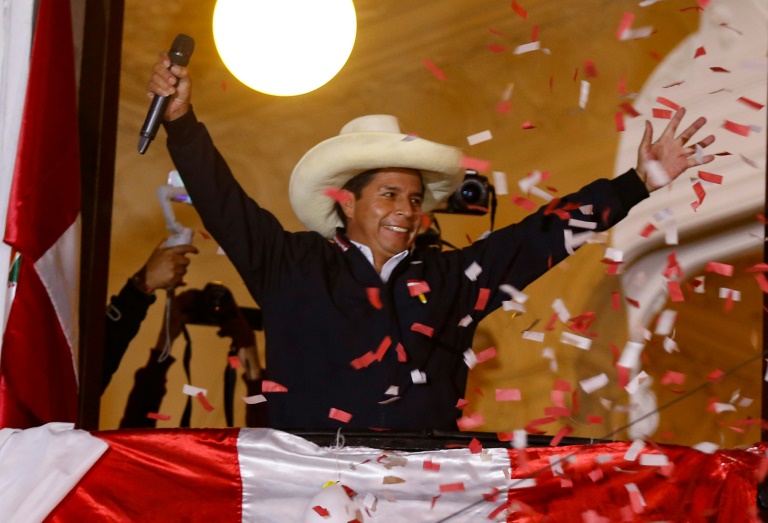Far-left trade unionist Pedro Castillo has cast himself as the winner of Peru’s presidential election, thanking foreign nations for “victory” messages even as election officials said Wednesday the race was not over.
With over 98 percent of votes cast in Sunday’s presidential poll counted by Wednesday morning, Castillo retained a leading score of 50.2 percent over rightwing populist rival Keiko Fujimori’s 49.7 percent.
Late Tuesday, addressing celebrating supporters in Lima, Castillo thanked Latin American countries for their messages of congratulations for his “victory”.
“We will be a government respectful of democracy, of the current constitution, we will… create a government with financial and economic stability,” he told the singing and dancing crowd.
He urged voting officials to be “respectful,” adding: “let us not tarnish the will of the Peruvian people.”
Castillo leads by more than 70,000 of the 17.4 million valid votes counted, but according to the ONPE election body, the contest officially remains open.
As in Peru’s three previous presidential elections, also tightly-run, the tail-end of voting has been slow due to delays in the arrival of votes in Lima from Peru’s rural and jungle areas, and from abroad — where a million of 25 million eligible voters live.
With 89.47 percent of expat votes counted so far, Fujimori has taken more than 66 percent, but Castillo has shown himself more popular among rural electors whose ballots are still trickling in.
– Three presidents in a week –
Peruvians voted on Sunday for their fifth president in three years after a series of crises and corruption scandals saw three different leaders in the office in a single week last year.
Fujimori, 46, had led in early counting, but Castillo, 51, gained ground as votes from rural areas started coming in.
Late Monday, Fujimori alleged “irregularities” and “signs of fraud,” telling a press conference she had evidence of “a clear intention to boycott the popular will.”
For Fujimori, the stakes are higher than mere power.
Prosecutors in Peru have said they want to seek a prison term of more than 30 years for her on charges of taking money from scandal-tainted Brazilian construction giant Odebrecht to fund presidential bids in 2011 and 2016. She has already spent 16 months in pretrial detention.
Under Peruvian law, an election victory would see the charges suspended until after her term, but defeat could see her put on trial.
The ONPE dismissed any possibility of counting fraud, as did the Organization of American States which described the process as transparent.
– Polar opposites –
Whoever wins the ideological battle between left and right will take leadership of a nation battered by recession and the world’s worst coronavirus fatality rate, with more than 186,000 deaths among its 33 million population.
Two million Peruvians have lost their jobs during the pandemic and nearly a third now live in poverty, according to official figures.
Peruvians will also be looking for stability, with seven of their last 10 leaders either convicted or under investigation for graft.
In April, Castillo caused an upset by topping the first round of voting in the election to replace the latest caretaker president, Francisco Sagasti. Fujimori came in second.
The relatively unknown teacher was also consistently ahead of his rival, though narrowly so, in opinion polls ahead of Sunday’s runoff vote.
– ‘Communist’ threat –
Fujimori, the daughter of jailed ex-president Alberto Fujimori, backs a neoliberal economic model of tax cuts and boosting private activity to generate jobs.
Castillo has pledged to nationalize vital industries, raise taxes and increase state regulation. He has vowed to forgo a presidential salary and live on his teacher’s wages.
Favored by the business sector and middle classes, Fujimori — her bastion is the capital Lima — sought to portray Castillo as a communist threat and warned Peru risked becoming a new Venezuela or North Korea.
Castillo, in turn, pointed to the Fujimori family’s history of corruption scandals.










